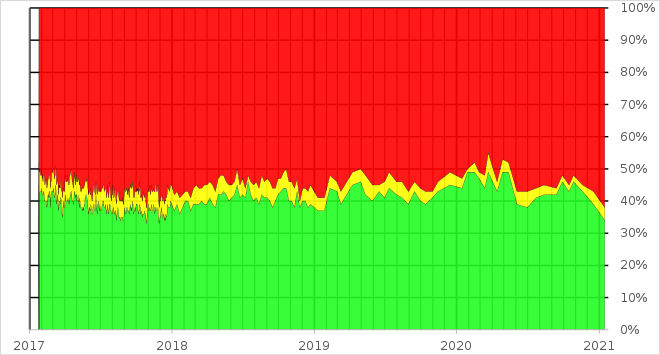Presidency of Donald Trump
 | |
Presidency of Donald Trump | |
|---|---|
| January 20, 2017 – January 20, 2021 | |
| Party | Republican |
| Election | 2016 |
| Seat | White House |
| Archived website | |
| Library website | |
The presidency of Donald Trump as the 45th president of the United States began with his inauguration on January 20, 2017, and ended on January 20, 2021.
2016 presidential election
[change | change source]
On November 9, 2016, Republican Donald Trump of New York and Governor Mike Pence of Indiana won the 2016 election, defeating former Democratic secretary of state Hillary Clinton of New York and U.S. senator Tim Kaine of Virginia. Trump won 304 electoral votes compared to Clinton's 227, although Clinton won the popular vote, receiving nearly 2.9 million more votes than Trump. Trump then became the fifth person to win the presidency while losing the popular vote.[1] In the congressional elections, Republicans maintained majorities in both the House of Representatives and the Senate.
Personnel
[change | change source]The Trump administration has had record turnover, particularly among White House staff. By the end of his first year in office, 34 percent of Trump's original staff had resigned, been fired, or been reassigned.[2] As of early March 2018[update], 43 percent of senior White House positions had turned over.[3]
On September 5, 2018, The New York Times published an article entitled "I Am Part of the Resistance Inside the Trump Administration",[4] written by an anonymous senior official in the Trump administration. The author asserted that "many of the senior officials in his own administration are working diligently from within to frustrate parts of his agenda and his worst inclinations."
In Office
[change | change source]Trump's presidency was marked by a focus on economic issues, tax reforms, immigration and deregulation. He implemented a conservative agenda, appointed three Supreme Court justices, withdrew from the Paris Agreement on climate change, and engaged in historic meetings with North Korean leader Kim Jong-un. However, his tenure was also characterized by controversy, including impeachment proceedings related to his dealings with Ukraine and the Trump administration family separation policy.
Elections during the Trump presidency
[change | change source]| Congress | Senate | House |
|---|---|---|
| 115th[1] | 52 | 241 |
| 116th | 53 | 200 |
2018 mid-term elections
[change | change source]In the 2018 mid-term elections, Democrats won control of the House of Representatives, while Republicans expanded their majority in the Senate.[5]
2020 presidential election
[change | change source]In the 2020 presidential election, Trump and Vice President Mike Pence ran against former Vice President Joe Biden and U.S. Senator Kamala Harris. The president and vice president lost both the electoral college and the popular vote.
This made Trump the first incumbent president since 1992 to lose his re-election bid. Trump and Pence left office on January 20, 2021.
Historical evaluations and public opinion
[change | change source]
By the end of Trump's first year in office, opinion polls showed him as the least popular United States president since 1945.[6] He said many false and misleading things in his campaign and presidency. Those things were documented by fact-checkers.[7]
Early in his presidency, the Trump administration developed a controversial relationship with mass media. He repeatedly said it was the "fake news".[8] In general, news outlets have made false facts before.
Trump's most repeated false statements were each repeated over 100 times during his presidency.[source?] They included that the "Trump wall" was already being built, that a U.S. trade deficit would be a "loss" for the country, and that the American economy was the strongest ever during his administration.
References
[change | change source]- ↑ "Trump's victory another example of how Electoral College wins are bigger than popular vote ones". Pew Research Center. December 20, 2016.
- ↑ Trimble, Megan (December 28, 2017). "Trump White House Has Highest Turnover in 40 Years". U.S. News. Retrieved March 16, 2018.
- ↑ Keith, Tamara. "White House Staff Turnover Was Already Record-Setting. Then More Advisers Left". NPR. Retrieved March 16, 2018.
- ↑ "Opinion - I Am Part of the Resistance Inside the Trump Administration". The New York Times. September 5, 2018. Retrieved September 6, 2018.
- ↑ Cillizza, Chris (November 10, 2018). "2018 was a WAY better election for Democrats than most people seem to think". CNN. Retrieved November 12, 2018.
- ↑ How Trump Ranks (Report). Five Thirty Eight. Retrieved February 20, 2019.
- ↑ It's True: Trump is Lying More, and He's Doing it on Purpose. New Yorker. Retrieved February 20, 2019.
- ↑ "Trump Keeps Saying 'Enemy of the People'". The Business Insider. Retrieved February 20, 2019.